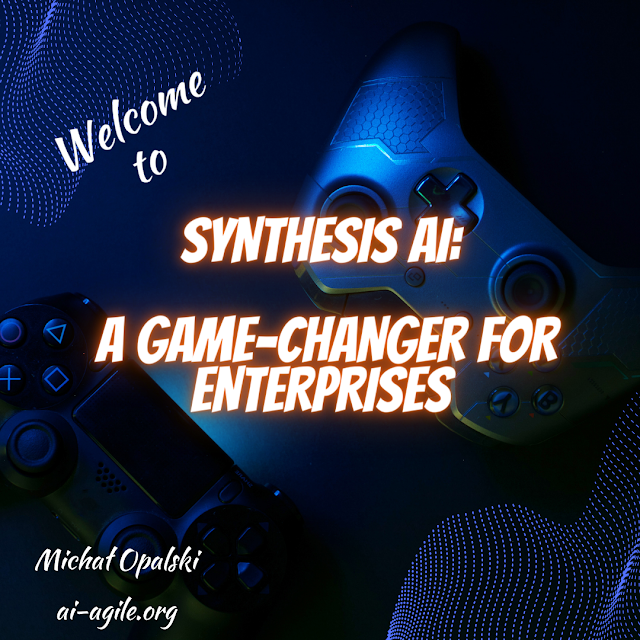Synthesis AI: A Game-Changer for Enterprises - Michał Opalski / ai-agile.org
The rapid evolution of artificial intelligence (AI) has led to several breakthroughs and innovations in recent years. One such advancement is the rise of Synthesis AI – a technique that brings together various AI functionalities to create a more holistic and adaptive system. But is it really a game-changer for enterprises? Let's dive in to understand the profound impact Synthesis AI can have on businesses.
What is Synthesis AI?
At its core, Synthesis AI combines multiple branches of AI, like machine learning (ML), natural language processing (NLP), and computer vision, to build versatile and comprehensive solutions. This synthetic approach allows AI to function more like a human brain, processing different types of information simultaneously and offering more adaptable and powerful outcomes.
Key Benefits of Synthesis AI for Enterprises
Improved Decision Making: Traditional AI models focus on specific datasets and tasks. With the blended approach of Synthesis AI, enterprises can analyze data from various sources simultaneously, resulting in more informed and accurate decisions.
Enhanced User Experience: Synthesis AI can better understand and cater to user needs. By combining NLP with ML, for instance, a customer service chatbot can comprehend context, emotion, and history, leading to more personalized and effective interactions.
Cost and Time Efficiency: Instead of investing in multiple standalone AI solutions, businesses can harness the power of Synthesis AI to meet various needs. This consolidation can lead to significant cost savings and faster results.
Scalability: As businesses grow, their data sources and requirements can change. Synthesis AI’s flexible nature allows it to incorporate new data sources and functionalities with ease, ensuring that the AI solutions scale with the business.
Innovation: Combining various AI disciplines opens the door to new possibilities. For example, merging computer vision with ML can lead to advanced predictive maintenance in manufacturing, where machines can visually inspect parts and predict when they might fail.
Real-World Applications in Enterprises
Healthcare: Synthesis AI can revolutionize diagnostics by combining patient medical histories, real-time monitoring, and medical imaging. This results in faster and more accurate diagnoses, ultimately improving patient outcomes.
Finance: In the banking sector, fraud detection can be enhanced by integrating transactional data analysis with behavioral analytics, ensuring more robust security measures.
E-Commerce: Personalized shopping experiences can be achieved by merging browsing habits, past purchases, and even sentiment analysis from customer reviews.
Supply Chain Management: Predictive analytics, combined with real-time tracking, can optimize inventory levels, reduce waste, and improve delivery times.
Challenges and Considerations
While Synthesis AI promises transformative benefits, it’s not without challenges:
Data Privacy and Security: As Synthesis AI uses data from multiple sources, ensuring the privacy and security of this data becomes paramount.
Complexity: Integrating multiple AI systems can be intricate, requiring expert knowledge and resources.
Bias and Fairness: Combining datasets can sometimes amplify inherent biases present in them, leading to skewed results.
Regulatory Compliance: As with any advanced AI, ensuring Synthesis AI complies with local and international regulations is essential.
Conclusion
Synthesis AI is undoubtedly poised to reshape the landscape of enterprise solutions. Its ability to consolidate functionalities, provide enriched insights, and foster innovation makes it a compelling choice for businesses looking to stay ahead in an increasingly competitive market. However, as with any technological advance, a measured and informed approach is necessary. As enterprises embark on their Synthesis AI journey, striking a balance between innovation and responsibility will be crucial.


